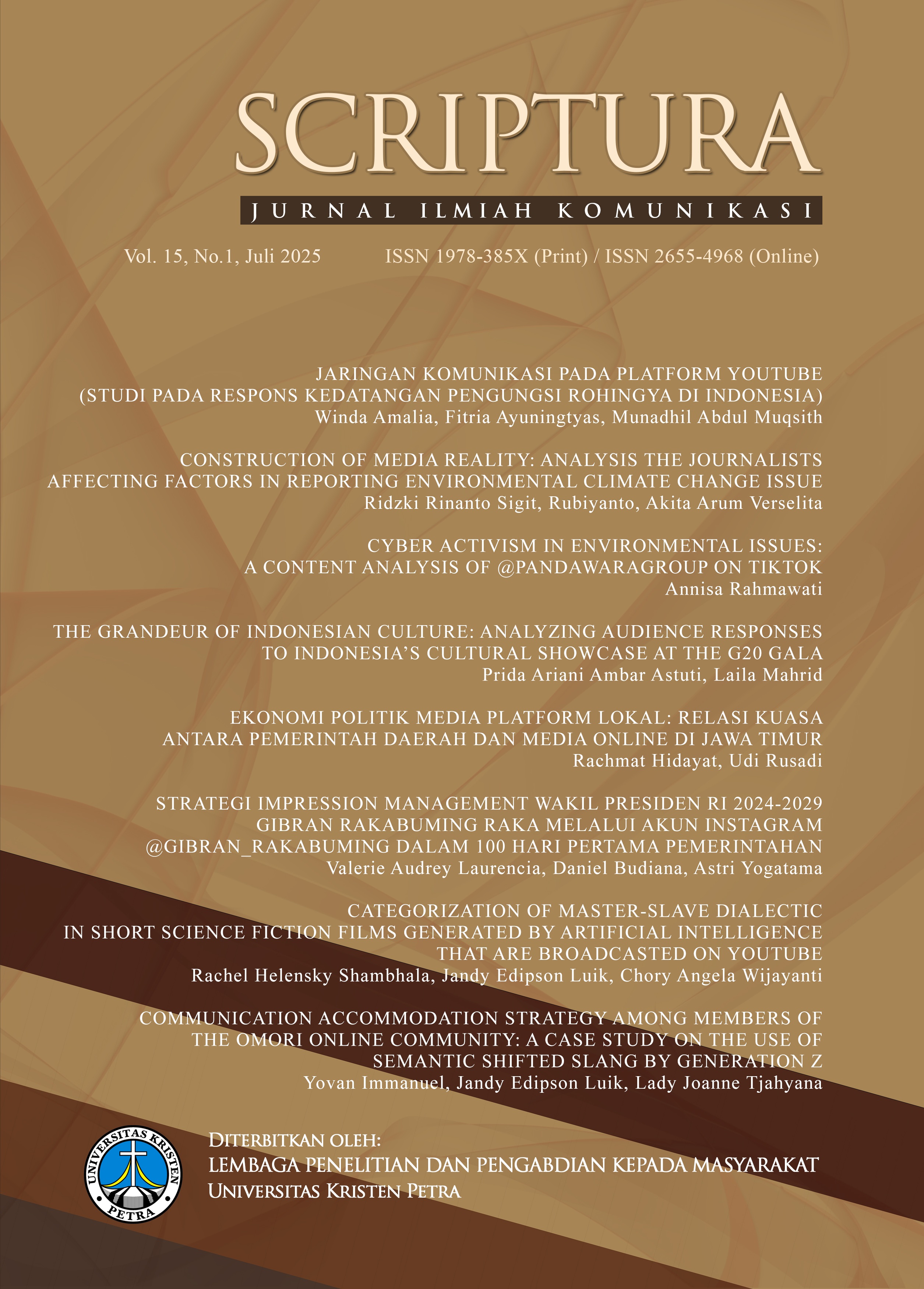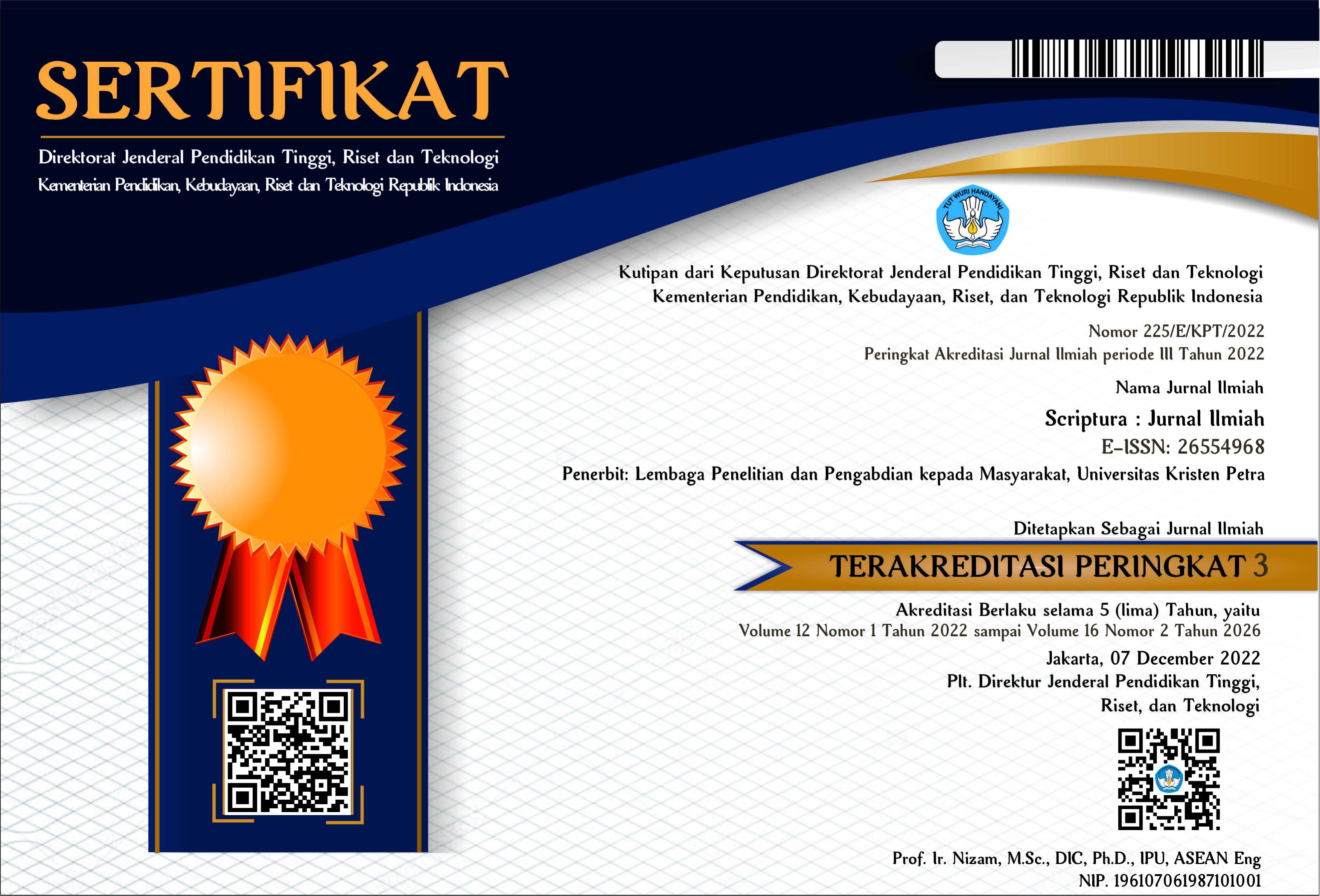The Grandeur of Indonesian Culture: Analyzing Audience Responses to Indonesia’s Cultural Showcase at the G20 Gala
DOI:
https://doi.org/10.9744/scriptura.15.1.39-49Keywords:
audience perception, cultural performance, Indonesia's cultural diversity, Kompas TV, uses and gratificationAbstract
This study analyzes audience perceptions of the Cultural Performance G20 broadcast on Kompas TV’s YouTube channel as a medium for transmitting Indonesia’s cultural diversity values. Employing a quantitative approach with a descriptive survey method, the research involved 100 respondents who are subscribers of Kompas TV on YouTube. The findings reveal that viewers have a positive perception of the broadcast, particularly on the cultural voice-over, which effectively highlights the richness of Indonesian culture. The results indicate that creatively packaged audio-visual content with strong narratives, visuals, and high-quality audio can enhance audience appreciation of cultural diversity. Based on the Uses and Gratification theory, the broadcast fulfills audience needs for information, entertainment, and personal identity, especially among Generation Z, which dominates the respondents.
References
AlDahoul, N., Ibrahim, H., Park, M., Rahwan, T., & Zaki, Y. (2024). Inclusive content reduces racial and gender biases, yet non-inclusive content dominates popular culture. ArXiv. https://arxiv.org/abs/2405.06404
Ashfiya, D. A. N. (2025). Kasus intoleransi di Indonesia: Jumlah, penyebab, pelaku dan contohnya. GoodStats. https://goodstats.id/article/intoleransi-agama-di-indonesia-HdiJwhttps://goodstats.id/article/intoleransi-agama-di-indonesia-HdiJw
Asmar, A. (2020). Ekspresi keberagaman online: Media Baru dan dakwah. Jurnal Ilmu Dakwah, 40(1), 54-64. https://scispace.com/pdf/ekspresi-keberagaman-online-media-baru-dan-dakwah-1bfdm7pac1.pdf?
Chandra, E., Gultom, S., Dharma, E., & Sherly. (2025). Penguatan toleransi beragama melalui program harmoni antar agama di tingkat komunitas. Jurnal Pengabdian Masyarakat: Pemberdayaan, Inovasi dan Perubahan, 5(2), 133-141. https://jurnal.penerbitwidina.com/index.php/JPMWidina/article/viewFile/1509/1212?
Chen, W. (2024). Cultural diversity in media: Promoting inclusivity and representation. Global Media Journal, 22(69). DOI:10.36648/1550-7521.22.69.442
Fahma, F., Safitri, D., Sujarwo. (2024). Dinamika identitas budaya dalam era globalisasi: Tantangan dan kesempatan media sosial terhadap budaya masyarakat lokal. JICN: Jurnal Intelek dan Cendikiawan Nusantara, 1(3), 3675-3682. https://jicnusantara.com/index.php/jicn/article/view/423
Farisal, U., Widiyanarti, T., Sianturi, M. K., Ningrum, A. J., Fatimah, Y., Hastuti, P. D., Abdilah, A., & Desmonda, W. K. (2024). Menghubungkan dunia: Peran media digital dalam mengatasi kesenjangan budaya. Indonesian Culture and Religion Issues, 1(4), 1-10. https://doi.org/10.47134/diksima.v1i4.105
Fundrika, B., A., & Efendi, D., A. (2023). Mahasiswa Aceh usir pengungsi Rohingya disebut Xenofobia, istilah apa itu? Suara.com. https://www.suara.com/lifestyle/2023/12/31/093000/mahasiswa-aceh-usir-pengungsi-rohingya-disebut-xenofobia-istilah-apa-itu
Habibah, J. N., Abdullah, M. N. A., & Rizaldi, M. R. (2025). Perspektif sosiologi terhadap toleransi dalam pluralisme digital: Studi kasus program login Habib Ja'far channel YouTube@Deddy Corbuzier. JUPANK (Jurnal Pancasila dan Kewarganegaraan), 5(1), 673-684. https://jurnal.umb.ac.id/index.php/jupank/article/view/8099/4761?
Hasan, K., Utami, A., Eni, S., Izzah, N., & Ramadhana, S. C. (2023). Komunikasi di era digital: Analisis media konvensional vs new media pada kalangan mahasiswa ilmu komunikasi Universitas Malikussaleh angkatan 2021. Jurnal Komunikasi Pemberdayaan, 2(1), 56-63. https://doi.org/10.47431/jkp.v2i1.302
Iswinarno, C. (2023). Dua kelompok yang bentrok di kota Bitung tanda tangani kesepakatan damai disaksikan FKUB dan BKSUA. Suara.com. https://www.suara.com/news/2023/11/26/010000/dua-kelompok-yang-bentrok-di-kota-bitung-tanda-tangani-kesepakatan-damai-disaksikan-fkub-dan-bksua
Katz, E., Blumler, J. G., & Gurevitch, M. (2020). Uses and Gratifications Theory. In D. M. Haridakis, M. C. Hugenberg, & A. J. Earnheardt (Eds.), The SAGE Encyclopedia of Mass Media and Society. SAGE Publications. https://sk.sagepub.com/ency/edvol/the-sage-encyclopedia-of-mass-media-and-society/chpt/uses-gratifications-theory
Khumairah, A., Simamora, D. K., Sitepu, I. D. A., Adhawina, R., & Tansliova, L. (2024). Evaluasi keanekaragaman bahasa di era digital dan milenial: Evolusi bahasa Indonesia dan tantangannya. Jurnal Penelitian Ilmiah Multidisiplin, 8(5), 625-633. https://sejurnal.com/pub/index.php/jpim/article/view/1693
Lamberti, G. (2025). Access to digital culture as a driver of social and cultural openness: European evidence. Humanities and Social Sciences Communications, 12(1), 1-11. https://doi.org/10.1057/s41599-024-04091-1
Luo, M. (2020). Entertainment over information? An empirical study of motivations and satisfaction in digital media use. People: International Journal of Social Sciences, 6(1), 14–27. https://grdspublishing.org/index.php/people/article/view/304
Maharjan, M., & Barata, F. T. (2021). The Kathmandu Valley's indigenous practices of safeguarding heritage: an assessment of present-day challenges. Journal of Cultural Heritage Management and Sustainable Development, 11(3), 214–225. https://doi.org/10.1108/JCHMSD-04-2020-0050
Manah, M., & Yudhawasthi, C. M. (2024). Digital storytelling melalui media sosial TikTok dalam promosi kuliner Bekasi. Scriptura, 14(1), 25-33. https://doi.org/10.9744/scriptura.14.1.25-33
Maryani, E. (2020). Analisis penggunaan media dan gratifikasi pada masa pandemi COVID-19: Studi masyarakat Indonesia. Jurnal Ilmu Komunikasi, 18(2), 145–159. https://www.academia.edu/97405434
Michael, L., Bison, I., Busso, M., Cernuzzi, L., De Götzen, A., Diwakar, S., Gal, K., Ganbold, A., Gaskell, G., Heesen, J., Miorandi, D., Schelenz, L., Segal, A., Sierra, C., Xu, H., & Giunchiglia, F. (2025). Towards Open Diversity-Aware Social Interactions. ArXiv. https://arxiv.org/abs/2503.16448
Nowsher, M., Conta, C. & Kamak, R. (2025). Cultural Diplomacy in an Interactive World. Research Gate. DOI:10.13140/RG.2.2.11580.14727
Nurisnaeny, P. S., Kaprisma, H. & Suwedi. (2024). Cultural diplomacy and global challenges in G20 Indonesia 2022," International Review of Humanities Studies, 9(1), Article 2. https://doi.org/10.7454/irhs.v9i1.1269
Paotonan, N. (2025). Dampak penggunaan media sosial terhadap sikap toleransi mahasiswa PPKN semester 2 Universitas Cendrawasih. Jurnal Wawasan Pengembangan Pendidikan, 13(1), 110-115. https://ejournal.undaris.ac.id/index.php/waspada/article/view/725
Pratama, A. R. (2024). Perilaku pengguna YouTube di Indonesia: Studi Uses and Gratification. ComPe: Communication and Performance Journal, 5(1), 12–25. https://jurnal.buddhidharma.ac.id/index.php/compe/article/download/2914/2087
Putri, R. D., Purwanto, E., Keyla, N., Kharismatika, R. N., & Muthmainah, K. A. (2024). Identitas budaya dalam era digital. Global Komunika, 7(2), 60-70. https://ejournal.upnvj.ac.id/GlobalKomunika/article/view/8304
Putria, N. A., Hidayah, N., Handayani, N., Intani, A., Khairunnisa, Putri, W. E., Silvina. (2025). The role of Pancasila in building tolerance between religious communities in multicultural society. Jurnal Edukasi Terkini (JET), 2(1), 8-15. https://jet.borneonovelty.com/index.php/jet/article/view/30
Rizvic, S., Boskovic, D., Okanovic, V., Sljivo, S., & Zukic, M. (2020). Interactive digital storytelling: Bringing cultural heritage in a classroom. ArXiv. https://arxiv.org/abs/2011.03675
Sabharwal, N., Ramesh, S., & Gupta, A. (2024). Users and Gratification Theory approach to understand why people use digital media mainly during lockdown. Journal of Media and Communication Studies, 16(3), 45–60. https://www.researchgate.net/publication/377505626
Santoso, G., Darmanto, A. P., Zahra, D. A. P., Wulandari, D., Nuham F. A., Putri, A., & Oktafiani, R. Perdamaian dunia dan implementasinya di negara Indonesia. Jurnal Pendidikan Transformatif (Jupetra), 2(3), 141-160. https://doi.org/10.9000/jpt.v2i3
Setara Institute. (2025). Siara pers kondisi kebebasan beragama/berkeyakinan 2024. https://setara-institute.org/siaran-pers-kondisi-kebebasan-beragamaberkeyakinan-kbb-2024/
Shuter, R., & Kurylo, A. (2015). Intercultural new media research for the 21st century. International Journal of Interactive Communication Systems and Technologies, 5(1), 4–9. https://www.researchgate.net/publication/281906708_Intercultural_New_media_Research_for_the_21st_Century
Sundar, S. S., Cho, H., & Xu, Q. (2022). YouTube users watching and sharing the news: A Uses and Gratifications approach. Journal of Broadcasting & Electronic Media, 66(2), 223–240. https://www.researchgate.net/publication/245572974
Telkom University Research Team. (2021). Social media user: Gratification and patterns in emerging adulthood. International Conference on Transformation in Communication Proceedings. https://repositori.telkomuniversity.ac.id/pustaka/files/123510
Wagner, K., & Strohmaier, M. (2023). Mastodon in the wild: Motivations and gratifications of alternative social media usage. ACM Conference on Web Science (WebSci 2023). https://arxiv.org/abs/2303.01285
Wibowo, A., Nugraha, S., & Sari, D. (2021). Media appeal and continuance intention on YouTube usage: A Uses and Gratification perspective. Jurnal Manajemen dan Komunikasi, 8(2), 77–88. https://www.atlantis-press.com/proceedings/icst-18/55910882
Yasir. (2021). Komunikasi pariwisata dalam pengembangan destinasi wisata di Kecamatan Kuok Kabupaten Kampar. Jurnal Kajian Komunikasi, 9(1), 108-120. https://doi.org/10.24198/jkk.v9i1.26170
Yuwafik, M. H., Lestari, D. F. A. P., & Gunawan, E. (2025). Strategi komunikasi multikultural dalam menanamkan nilai toleransi beragama pada santri di Pesantren Sunan Kalijago Malang. Journal of Communication Research (JCR), 1(1), 40–50. https://doi.org/10.61105/jcr.v1i1.172
Downloads
Published
How to Cite
Issue
Section
License
Copyright (c) 2025 Prida Ariani Ambar Astuti, Laila Mahrid

This work is licensed under a Creative Commons Attribution 4.0 International License.
Authors who publish in the SCRIPTURA Jurnal Ilmiah agree to the following terms:
Authors retain unrestricted copyright and full publishing rights. The authors grant the Publisher the right of first publication, with the work simultaneously licensed under the terms and conditions of the Creative Commons Attribution License (CC BY) that allows for unlimited use, distribution, and content reproduction on all media as long as the original author and source are properly acknowledged and cited.


















